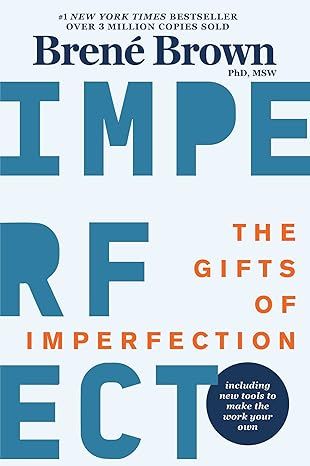The Gifts of Imperfection: 10th Anniversary Edition: Features a new foreword and brand-new tools
4.7 out of 5
42,318 global ratings
NEW YORK TIMES BESTSELLER • This tenth-anniversary edition of the game-changing #1 New York Times bestseller features a new foreword and new tools to make the work your own.
For over a decade, Brené Brown has found a special place in our hearts as a gifted mapmaker and a fellow traveler. She is both a social scientist and a kitchen-table friend whom you can always count on to tell the truth, make you laugh, and, on occasion, cry with you. And what’s now become a movement all started with The Gifts of Imperfection, which has sold more than two million copies in thirty-five different languages across the globe. What transforms this book from words on a page to effective daily practices are the ten guideposts to wholehearted living. The guideposts not only help us understand the practices that will allow us to change our lives and families, they also walk us through the unattainable and sabotaging expectations that get in the way. Brené writes, “This book is an invitation to join a wholehearted revolution. A small, quiet, grassroots movement that starts with each of us saying, ‘My story matters because I matter.’ Revolution might sound a little dramatic, but in this world, choosing authenticity and worthiness is an absolute act of resistance.”
208 pages,
Kindle
Audiobook
Hardcover
Paperback
Audio CD
First published February 28, 2022
ISBN 9781616499600
About the authors
Brené Brown
Dr. Brené Brown is a research professor at the University of Houston, where she holds the Huffington Foundation Endowed Chair at the Graduate College of Social Work. She also holds the position of visiting professor in management at the University of Texas at Austin McCombs School of Business.
Brené has spent the past two decades studying courage, vulnerability, shame, and empathy. She is the author of six #1 New York Times best sellers and is the host of two award-winning Spotify podcasts, Unlocking Us and Dare to Lead.
Brené’s books have been translated into more than 30 languages, and her titles include Atlas of the Heart, Dare to Lead, Braving the Wilderness, Rising Strong, Daring Greatly, and The Gifts of Imperfection. With Tarana Burke, she co-edited the best-selling anthology You Are Your Best Thing: Vulnerability, Shame Resilience, and the Black Experience.
Brené’s TED talk on the Power of Vulnerability is one of the top five most-viewed TED talks in the world, with over 50 million views. Brené is the first researcher to have a filmed lecture on Netflix, and in March 2022, she launched a new show on HBO Max that focuses on her latest book, Atlas of the Heart.
Brené spends most of her time working in organizations around the world, helping develop braver leaders and more-courageous cultures. She lives in Houston, Texas, with her husband, Steve. They have two children, Ellen and Charlie, and a weird Bichon named Lucy.
Read more
Reviews
Jacky
5
Just as listed
Reviewed in the United States on October 14, 2024
Verified Purchase
Ordered this book for my book club. Fit exact description and in great condition. The price was very affordable. Very happy with my purchase.
Angela Risner The Sassy Orange
5
Simple to read and understand, but such a powerful, life-changing message
Reviewed in the United States on January 29, 2014
Verified Purchase
This is the first book by Brene Brown that I've read. I just happened across the title on a friend's Facebook page and thought it looked interesting. How did I live without Brene Brown in my life before?? This book falls right in line with others I've read recently (Stephen Cope's The Great Work of Your Life, Gretchen Rubin's The Happiness Project, etc.) in reaffirming that if you live your life according to "Supposed to Be," you will never be happy.
I can't possibly share all of my favorite parts (I have 31 pages of highlights), but here are a few:
•People may call what happens at midlife "a crisis," but it's not. It's an unraveling - a time when you feel a desperate pull to live the life you want to live, not the one you're "supposed' to live. The unraveling is a time when you are challenged by the universe to let go of you think you are supposed to be and to embrace who you are. •It's like walking toward a star in the sky. We never really arrive, but we certainly know that we're heading in the right direction. •Owning our story can be hard but not nearly as difficult as spending our lives running from it. Embracing our vulnerabilities is risky but not nearly as dangerous as giving up on love and belonging and joy - the experiences that make us the most vulnerable. Only when we are brave enough to explore the darkness will we discover the infinite power of our light. •Shame hates it when we reach out and tell our story. It hates having words wrapped around it - it can't survive being shared. Shame loves secrecy. The most dangerous thing to do after a shaming experience is hide or bury our story. When we bury our story, the shame metastasizes. •The root of the word courage is cor - the Latin word for heart. In one of its earliest forms, the word courage had a very different definition than it does today. Courage originally meant, "To speak one's mind by telling all one's heart." •Every time we choose courage, we make everyone around us a little better and the world is a little braver. And our world could stand to be a little kinder and braver. •The word compassion is derived from the Latin words pati and cum, meaning "to suffer with." I don't believe that compassion is our default response. I think our first response to pain - ours or someone else's - is to self-protect. We protect ourselves by looking for someone or something to blame. Or sometimes we shield ourselves by turning to judgment or by immediately going into fix-it mode. •Chodron: "Compassion is not a relationship between the healer and the wounded. It's a relationship between equals. Only when we know our own darkness well can we be present with the darkness of others. Compassion becomes real when we recognize our shared humanity." •The heart of compassion is really acceptance. The better we are at accepting ourselves and others, the more compassionate we become. Well, it's difficult to accept people when they are hurting us or taking advantage of us or walking all over us. This research has taught me that if we really want to practice compassion, we have to start by setting boundaries and holding people accountable for their behavior. •We can confront someone their behavior, or fire someone, or fail a student, or discipline a child without berating them or putting them down. The key is to separate people from their behaviors - to address what they're doing, not who they are.
Wonderful, wonderful book. Amazing revelations.
Highly recommend.
Read more
13 people found this helpful
Selene A.
5
A life changing perspective
Reviewed in the United States on August 28, 2024
Verified Purchase
This book provides a fresh perspective and a safe path to be your authentic self. I have never read a book that truly made me feel safe as I looked inward. Brene’s Way with words are funny and so relatable it pulls out the real emotion in you to seek and learn for yourself. I highly recommend this for anyone wondering the possibilities out there.
4 people found this helpful
Laura Navarrete
5
Eye Opening
Reviewed in the United States on December 11, 2017
Verified Purchase
With someone struggling with self-esteem issues since they were eight years old (I’m currently 18), the book The Gifts of Imperfection by Brene Brown helped me out so much in the aspect on how to practice self-love and knowing what my worth is. My goal was to learn how to value and love myself for who I am and how I could possibly grow from my vulnerabilities. Needless to say, the book met my goals. Brene Brown is a writer and a researcher at the University of Houston Graduate College of Social Work. She is a very intellectual author and how she had the patience to research the topics in her book such as Cultivating Authenticity and Wholehearted Living. The topics covered in this book are self-love, self-worth, connection, compassion, courage, and so many others. Brown’s goal as an author for this book was to make people realize that no matter what people said or thought about you, it was important for you to understand that you “are worthy of love and belonging now. Right this minute.” (Brown, 24.) What I loved about the book is how deep it truly is--how knowing your self-worth and how to practice self-love is a constant war that’s with you every day of your life. As I kept reading along, I definitely knew that the book filled its purpose of explaining and knowing what my worth is. It made me realize that I need to be a bit kinder to myself and silencing that annoying voice that sometimes tends to creep up on me whispering, you’re not enough and you never will be. All great books have some flaws that the reader may or may not agree with. I absolutely adored this book but, there were some things here and there that got in the way at times. Sometimes, the book may be difficult to understand what exactly the author is trying to get at like when she is trying to distinguish between shame and guilt she proceeds to state it as, “the difference between shame and guilt is best understood as the differences between “I am bad” and “I did something bad.” (Brown, 41.) This can be confusing the first time you read it, but if you take the patience to break it down and analyze it, it won’t be too challenging. The book (in general) can get a bit repetitive, but it makes sense due to the fact that all ties back together at the end. This book is astoundingly great for a person who wants to learn how to be kinder to themselves and value the gifts of imperfection that they may have. Thus, making me rate the book 4.8/5 due to its wisdom and it’s rich content of research that Brown provided. Afterall, according to Brene Brown “practicing self-love is learning how to trust ourselves, to treat ourselves with respect, and be kind and affectionate toward ourselves.” (Brown, 27).
Read more
4 people found this helpful
Alice
5
Great reminders
Reviewed in the United States on September 29, 2024
Verified Purchase
Brene’ Brown is a wonderful author who speaks with wisdom, compassion and courage in all things related to matters of the heart.
Kristen B
5
A Book that Changed My Life
Reviewed in the United States on March 7, 2012
Verified Purchase
-I originally bought this book in May of 2011. I can't remember exactly why it spoke to me, but I know I was looking for self esteem boosting books. I think maybe the title resonated because I realized I was having some trouble with perfectionism. Accepting mistakes, compassion for myself, forgiving myself, but also pushing forward to being a better person, a better worker, friend, girlfriend, etc. It resonates today because I see how much of a perfectionist I can be, and how much trouble I am having forgiving myself for past mistakes, and trying not to label myself because of them. I am having trouble sufficiently feeling the guilt enough to change, letting that feeling in, but then forgiving myself, and not letting those behaviors define who I am as a person. How did the book address this?
-I think these quotes from the book really get to the heart of the message: "Perfectionism is, at its core, about trying to earn approval and acceptance.... Healthy striving is self-focused--How can I improve? Perfectionism is other-focused--What will they think?... Perfectionism is addictive because when we invariably do experience shame, judgment, and blame, we often believe it's because we weren't perfect enough. So rather than questioning the faulty logic of perfectionism, we become even more entrenched in our quest to live, look, and do everything just right." Brown, Brene (2010-09-20). The Gifts of Imperfection (p. 56-57). Hazelden. Kindle Edition. -What I got from this is that perfectionism tricks us into thinking we have it all: we can feel connected and invulnerable and in control. BUT, it is ultimately unsatisfying because it #1) it is a lie. We aren't in control or invulnerable, or perfect. And #2) it requires us to change who we are -- and the connection we most desire is a connection based on being truly known by another person. So in order to feel connected AND known, we have to accept the reality that we are imperfect, and we are vulnerable, and we are not in control. -And while connection is obviously a huge source of joy, Brene also talks about the other kinds of joy that perfectionism halts in its tracks: meaningful work, enjoyable hobbies, creative endeavors, etc. Again, because perfectionism tries to give us a sense of control, and thereby tries to prevent the possibility of loss, we often don't even try to have joyful things, or we deny the level of joy something is giving us in order to feel less hurt when it leaves. -And the book has a lot of great suggestions as to ways get past the feelings of inadequacy perfectionism is rooted in, and also ways to lean into the vulnerability of imperfection. Another great topic the book covered (and that it alerted me to) was the importance of shame as a barrier to self acceptance and love and joy. (But as you will see below, I really recommend its sister book for more on this piece). And I love Brene's emphasis on authenticity as a goal. It is fascinating and inspiring.
Where I still don't feel resolution:
-One of the things she mentions to get when you are feeling shame is getting connected, sharing your story. But I have a few concerns about that: -She doesn't explain in detail WHO has earned the right to hear your story and HOW to cultivate those friendships. If you are reading the book is stands to reason that you may very well not have those friendships. If you are cultivating your authenticity and dealing with feelings of inadequacy, you may have surrounded yourself with inauthentic and judgmental people because of your need for approval from these types. -Even if you are at some stage where you have a few compassionate and caring friends (which I do feel lucky enough to have), it requires them to always be open to your shame at the moment you need them without regard to the "stuff" they bring to the day. If you are feeling shame about X today, and so are they, your attempt at connection may trigger their shame even deeper and they will "imperfectly" push you away. I wanted her to talk more about those situations. It is great when you can have an empathetic ear to listen, and it feels amazing, but even with the world's best friends, you cannot always expect that will be available to you whenever you need it. -And then even if you catch your friends on a day where they are feeling great, or can be present to your needs and your shame, what if you are a "gusher," and you are at the beginning stages of dealing with your inadequacy issues, and you feel shame "a lot"? You can become an emotional drain to them, and push them away. I wanted some more information about self-soothing in shame situations, or how to manage connecting with friends in those moments. I am still not sure how I am going to be able integrate this intellectual understanding into a daily practice. When I do something "wrong", especially something I have done wrong a hundred times before, will I be able to lean into the guilt, instead of the shame? Will I be able to lean into the vulnerability? Will I be able to be present to the vulnerability around me?
I know a big part of this is simply practice. And finding strategies that resonate. But the first step for me is an intellectual understanding, and this is certainly worth reading if that is something that is important to you.
Supplementary Materials:
Read more
366 people found this helpful
Lisa Bourbonnais
5
The Best of Self-Improvement Literature!
Reviewed in the United States on July 12, 2015
Verified Purchase
The Gifts of Imperfection is a well written, thoroughly researched, compassionate must read book from the perspective of a seasoned and trustworthy professional, which contains a plethora of concrete information about how to live more genuinely and capably in the face of fear and self-doubt.Brene’ Brown writes her guide to achieving self-acceptance, self-esteem and well-rounded living, by focusing on her years of research on shame, fear, and vulnerability, providing the reader with specific ways people think and act that either challenge or welcome the topics. She highlights both hindrances and aids to living fully in ten guideposts or chapters, in which she explains ways people can use the information she’s learned from her research to let go of negative thoughts and emotions and let in the things that provide joy and contentment. The author’s ability to communicate, her status as an empathetic peer, and knowledge as a practiced researcher and social worker, shine through her writing, expertly bringing together her writing style and the useful information she imparts.
Brown writes intelligently and from the heart about the findings of her decade long research, providing personal anecdotes to frame the information, which humanizes her ideas, making the research less scientific and more relatable and applicable for the reader. The author tells the story of her own journey of curiosity, exploration, and growth which develops alongside her shame research. Brown tells about using her data to assemble a “do” and “don’t” list for feeding shame, fear, and vulnerability, and realizing, “This is just great, I’m living straight down the s*** list.” (xii) When she admits that this led to her “2007 Breakdown Spiritual Awakening,” the reader feels comforted and less overwhelmed by learning he or she is living similarly. By telling her own story and those of family, friends, and contributors to her blog, Brown powerfully and positively influences the reader’s experience of reading, processing, and retaining essential concepts.
This book provides its reader with a wealth of helpful and applicable information to be used now and in the future, not only planting the seeds for thinking about changing perspectives on shame, but providing the building blocks for developing new ways of thinking, acting, and living. Brown doesn’t simply suggest that a reader combat shame, for example, she tells how the people in her research live successful, complete lives in the face of it: with courage, compassion, and connection. In this example, one of many in the book where she shows not tells the reader how to enact change, there are clear definitions of the three C’s. The reader learns about living courageously and compassionately by the research Brown cites and examples she gives from people’s personal experiences. Brown efficiently communicates using similar methods for teaching the reader her other topics, which range from cultivating a resilient spirit, cultivating creativity, to cultivating meaningful work. The reader finishes the book both satisfied with the results and ready to read it again, knowing new ideas will be available each time through.
The winning combination of Brown’s personality, expertise and wisdom is irresistible and not to be missed. Both her personal and work experiences stand alone as readable material, but together they are entertaining and therapeutic. Any person looking to make his or her life better should look no further than The Gifts of Imperfection, as Brown has discovered in her research an area of sociology from which we can all benefit in a myriad of ways.
Read more
11 people found this helpful
Ciara Holt
5
LOVE HERR
Reviewed in the United States on October 2, 2024
Verified Purchase
great book, I recommend reading them in order
Lily
4
Life-changing- I highly recommend it
Reviewed in the United States on October 14, 2013
Verified Purchase
I love the content of this book, and I want to read it and re-read it again to stay on the right path. Some of the most helpful points for me were:
-
In order to feel joy, you have to lean into uncomfortable feelings and not numb pain (through food, TV, substances, sex/love, obsessions, etc), because you can't selectively numb emotions, so if you numb pain, you numb joy as well
-
That joy will often be accompanied by fear because we fear we will lose the things that make us joyful, so you can expect anxiety to come up when you are about to feel joy or in the midst of feeling joy. You have to be able to tolerate the discomfort, because If you can't tolerate discomfort, then you will lose your capacity to experience joy. But there is no way to feel joy without feeling vulnerability because this life has no guarantees. She suggests, very helpfully, that one focuses on gratitude in order to overcome it. I've practiced this and it helps a lot- she suggests saying "I feel vulnerable right now, and that's okay, I feel so grateful for..." Gratitude is the key to joy.
-
That we think we can avoid pain by avoiding feeling the joys in life, but actually you need to feel the joy fully in order to be able to handle the difficult things that will come up. If you never feel joy (because you are numbing yourself), then when difficult things happen you don't have the inner resources to handle them and you end up having to numb yourself more, then because you are numbing yourself, you don't feel joy, so it's a cycle.
-
That everyone is so busy trying present themselves in certain ways and live up to expectations in order to be accepted, but you can never feel true love and belonging if you don't present your real self (be authentic).
-
In order to be authentic you must have a lot of courage in order to risk being vulnerable, because you could present your true self and be rejected, but if you don't try you will never experience true belonging.
-
The root of feeling love and belonging is feeling worthy, now, just as you are, of love and belonging, because you have to believe that your true self is worthy in order to have the courage to be authentic.
-
Feeling worthy now is also the answer to handling shame. Shame is the fear of being unlovable, so believing that you are worthy is the opposite of shame and the antidote to shame. You have to face shame and practice using shame resilience (which she teaches in the book, which feeling worthy is at the root of) in order to overcome perfectionism.
I don't really love her writing style. You can really tell that she loves to put things in boxes, her background is as a researcher, and she loves definitions (and the majority of the definitions are really good and some of them are fantastic). But it means that her writing style doesn't seem to work the best for this subject matter. It feels like if she had a more of a clear, simple, inspirational tone, it could have had a little more flow and felt a little stronger, writing-wise. It's just a little hard to read sometimes, it feels a little clunky. But there are so many amazing parts that blow your mind and change your life, so it's totally worth reading.
She made some really amazing points about so many subjects, but there were several subjects she really just brushes through and says basically that she discovered that "these were important characteristics of whole-hearted people as well, and here are some other books to look at on the subject" but I didn't really think she herself made that many great points on these subjects. And maybe for other people she did say things that hit home, but the subjects I felt she could have worked more on were:
- Cultivating Intuition and Trusting Faith (This is a really huge thing for me, and now, from the book, I know that it is important to have faith to be whole-hearted, but I didn't get any closer to figuring out HOW to have faith from what she said)
- Cultivating Calm and Stillness (There is so much fantastic information out there on this subject, I would highly recommend the book "Mindsight" on this subject.)
- Cultivating Creativity, Play and Rest, Laughter, Song and Dance (these are fairly straight-forward topics, probably most people can figure out how to incorporate more of these things into their lives, but these chapters didn't feel like they offered a lot of useful points on the subjects, aside from just pointing you in the right directions towards doing these things- which in and of itself is very important!
- I wish she had said more about HOW to cultivate authenticity. The chapter on authenticity was chock-full of great points, but I would have loved more on how
- She discusses using boundaries and holding people accountable to be compassionate, instead of the usual shaming and blaming we do. I could have used A LOT more instruction and advice on HOW to use boundaries and hold people accountable in a compassionate way.
This book is life-changing, it is necessary reading for everyone in my opinion. The first chapter was actually the hardest to get through for me- writing-style wise. I actually thought it wasn't a good book and I put it down and considered it a bad investment after reading the first chapter- I felt it was full of fluff, and obvious stuff, and that it didn't have any useful information. But then thankfully, a month or two later, I picked it up again, and once you get to chapter two, everything starts getting a lot better. Then it kind of goes downhill again at Guidepost 5 and beyond. But between chapter two and guidepost 5, it is pure gold.
Read more
80 people found this helpful
KStar
3
Skip this and read DARING GREATLY
Reviewed in the United States on March 14, 2016
Verified Purchase
I read "Daring Greatly" about 6 months ago after watching Dr. Brown's TED talks and that book honest to goodness changed my life. I was excited to read this one, particularly because I found her discussion of perfectionism so helpful in Daring Greatly. I have to admit that as much as I still admire Brene Brown, I found this to be a watered down version of Daring Greatly and I kind of regret buying it (I don't regret READING it, but I do regret paying for it, and I don't feel that this improves my library).
I found this was a little shallow and abstract, whereas Daring Greatly so eloquently and articulately put words to ideas we understand intuitively, and it really enhanced my emotional vocabulary. This book offered little in that respect. Some of it (shame vs guilt, for example) was redundant of Daring Greatly (and other texts for that matter) and her discussion of ideas like intuition, spirituality, and numbing were vague and unhelpful to me. She was mostly quoting other people's definitions and discussion of these topics, and while some the quotes were thought-provoking, I didn't feel that it really enlightened me.
Her examples were also not as compelling in this text. It was mostly about her, and while some of the examples were useful and memorable, I came away feeling like she was painting a picture of her family rather than focusing on her research and data. Daring Greatly, on the other hand, was written in such an empathetic and compassionate way that I kept saying, "YES! That's me! She understands!" or "Wow! That's totally my brother-in-law!" It was like one light bulb after another going off. Reading Daring Greatly was so inspiring and healing. This book didn't have that same level of empathy and was missing that universal quality, focusing instead on examples that were auto-biographical. Some other reviewers said this read like a blog, and I have to agree. By the end of this book I didn't feel UNDERSTOOD like I did after reading Daring Greatly. I honestly felt that as I read Daring Greatly, Brene Brown was like looking inside me and having a conversation with me, even though she doesn't even know me. After reading The Gifts of Imperfection, however, I felt that I understood more about her and less about myself.
There was also something a little kitschy about this. She had a section after each chapter called DIG deep where she listed ways that she tries to employ these strategies, and she often said "Amen" at the end of some quotes. While cute, it lacked the maturity and empathy of Daring Greatly.
She was also a little judgmental in this book (towards others and towards herself) and I could ironically see her striving for perfectionism (like in order to be perfect she needs to become "wholehearted," so she is actively working to employ these strategies rather than actually embodying them). It is almost like by the time she got to Daring Greatly she was fully reborn and had reached that full enlightenment, and she was still working on getting there in this text.
Additionally, unlike Daring Greatly, this reads a little bit like a checklist (see comment above) of things you should do: 1. don't be a perfectionist 2. Get creative 3. Rest and play 4. But don't numb 5. Dance like no one is watching you 6. practice self-compassion 7. Have faith. By the end I felt like I was being told what to do to be happy, as if it was a formula. While some of the advice was certainly helpful, it wasn't inspiring in the same way Daring Greatly was. Daring Greatly got at the heart of one's emotions. It talked about courage, authenticity, compassion (true ideals) and it showed how there is extraordinary in the ordinary. The Gifts of Imperfection seemed to get sidetracked by specifics (dancing, jewelry making, her childhood house in New Orleans) and it never reached that universality that was so healing in Daring Greatly.
Lastly, this book was highly referential. As I said earlier, she quotes a lot of other people to get at defining abstract terms. She also references the work of many other psychologists, researchers, etc. For example, Kristin Neff and Marci Alboher. It isn't that I didn't appreciated her references, but this felt blog-like again: "Hey I read this and I LOVED this idea, check it out!" Or "this quote inspires me! Let me share." In contrast, it felt like Brene Brown had found her own voice in Daring Greatly, and no longer needed to continually reference others' work and could just share her research and the conclusions she reached from it.
All in all, while The Gifts of Imperfection was a nice book that offered a little refresher of Brown's understanding of "wholehearted living" with some ideas about intuition and faith, creativity, and song and dance, it was not as sophisticated or inspiring as her latest book Daring Greatly, which really felt like a true culmination of her research and experiences. I'd skip this one; or at least just borrow it from the library...
Read more
1 people found this helpful
Top Brené Brown titles
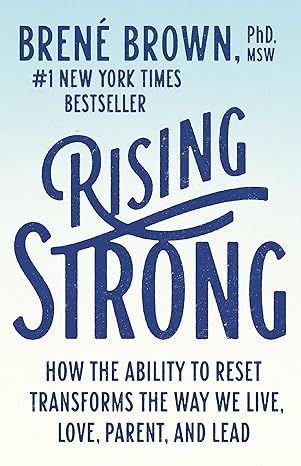
Rising Strong: How the Ability to Reset Transforms the Way We Live, Love, Parent, and Lead
4.7
-
11,216
$0.99
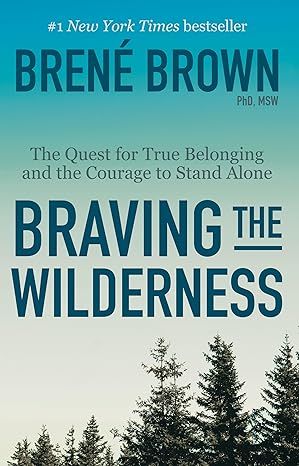
Braving the Wilderness: The Quest for True Belonging and the Courage to Stand Alone
4.6
-
14,403
$0.99
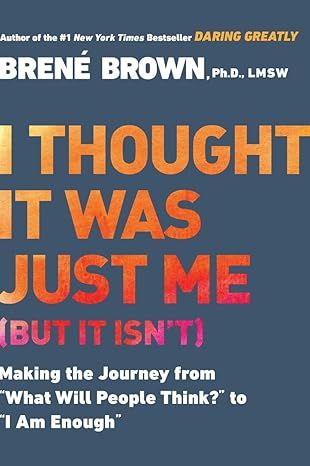
I Thought It Was Just Me (but it isn't): Making the Journey from "What Will People Think?" to "I Am Enough"
4.7
-
7,822
$0.99
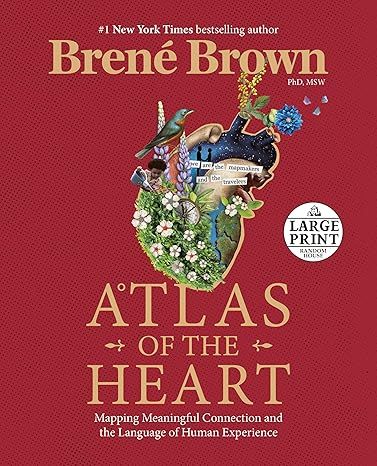
Atlas of the Heart: Mapping Meaningful Connection and the Language of Human Experience (Random House Large Print)
4.7
-
20,467
$0.99
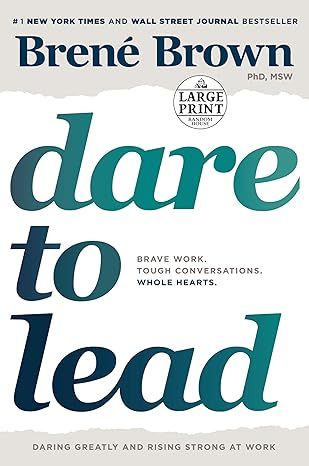
Dare to Lead: Brave Work. Tough Conversations. Whole Hearts.
4.7
-
21,212
$0.99
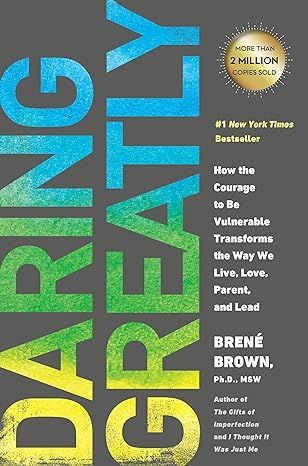
Daring Greatly: How the Courage to Be Vulnerable Transforms the Way We Live, Love, Parent, and Lead
4.7
-
30,025
$4.43
Best Sellers

The Tuscan Child
4.2
-
100,022
$8.39

The Thursday Murder Club: A Novel (A Thursday Murder Club Mystery)
4.3
-
155,575
$6.33

Sapiens: A Brief History of Humankind
4.6
-
140,302
$13.49

The Butterfly Garden (The Collector, 1)
4.3
-
88,556
$9.59

Things We Hide from the Light (Knockemout Series, 2)
4.4
-
94,890
$11.66

The Last Thing He Told Me: A Novel
4.3
-
154,085
$2.99

The Perfect Marriage: A Completely Gripping Psychological Suspense
4.3
-
143,196
$9.47

The Coworker
4.1
-
80,003
$13.48

First Lie Wins: A Novel (Random House Large Print)
4.3
-
54,062
$14.99

Mile High (Windy City Series Book 1)
4.4
-
59,745
$16.19

Layla
4.2
-
107,613
$8.99

The Locked Door
4.4
-
94,673
$8.53
